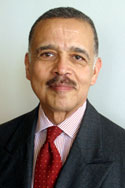ARCHIVES
OF EDITORIALS
September 4, 2003
A work in progress
Forty years ago on August 28, 1963, Martin Luther
King, Jr. electrified the American conscience with his “I
have a Dream Speech” in the nation’s capital. The
impact of this speech was so great that the US Congress passed
the Civil Rights Act of 1964 in the following year.
Many believe that the moral authority of Dr. King’s words
established such a transcendental vision of what America could
be that many whites became committed to change the nation’s
mores. At that time throughout the South, and elsewhere, African
Americans were barred from many restaurants, hotels and other
places of public accommodation. Discrimination in employment was
widespread. Opportunities for blacks were limited in public and
private higher education.
With his “I Have a Dream Speech” Dr. King changed
the legal infrastructure that supported America’s racial
discrimination. Indeed, many of the hostile bigoted attitudes
remained, but those who harbored them found themselves adrift
without the customary substantial support of society. At this
point, efforts to continue racial discrimination in America went
underground.
Of course overt vestiges of the ante bellum South remain. The
skinheads, the Aryan Nation, and what is left of the Ku Klux Klan
and the White Citizens Councils openly parade their racist venom.
However, public etiquette no longer tolerates these embarrassing
practices of an earlier era. There is now a legal injunction to
be civil, even if the old attitudes remain.
Dr. King’s dream resonated in the hearts of African Americans.
The Christian upbringing common in the group tought that all humans
are children of God and they stand on equal footing in God’s
eyes. Because of this truth, no movement to organize racial retribution
beyond self defense has ever been well received by blacks.
Dr. King’s speech was so powerful that many blacks have
clung to it without fully realizing the effort necessary to make
the dream a reality. After the Civil Rights Act was passed in
1964 and the Voting Rights Act the next year, for the first time
since they landed in America blacks could claim they were free.
That does not mean, however, that they have realized their share
of the American dream.
Dr. King gave blacks the vision, but considerably more effort
by blacks is necessary to attain for everyone the equality that
the dream promises.
Academic proficiency — the new battlefront
Those who are young have no personal knowledge of
the brutality inflicted upon African Americans up until the mid
1960’s. The states of the old Confederacy were the primary
breeding grounds for racial hostility, but bigotry was by no mans
confined to the South. Fortunately, the rank physical abuse, including
lynching, which was once common in this country has dissipated
since enactment of civil rights protections.
It was relatively easy to organize blacks to oppose the violation
of civil rights. However, it is much more difficult to energize
blacks to oppose the many subtle forms of racial discrimination
which create an economic disadvantage. As American society becomes
increasingly more complex and technological, the objective of
concerted social action becomes more difficult to achieve.
One fact is clear. There can be no major progress for African
Americans as a group without improving the level of academic achievement.
Everyone must insist as another school year begins that students
attain academic proficiency. From now on proficiency is essential
for future advancement.
Home
Page

